- Home
- Simon Beckett
Written in Bone dh-2 Page 7
Written in Bone dh-2 Read online
Page 7
‘It’s not much to look at, but it’s reliable enough,’ she said, giving me the keys. ‘And I’ve made a flask of tea and sandwiches for you all. I’d guess you won’t want to be running back here to eat.’
I thanked her as I took them. The VW grated and whined when I started it, but it rattled along happily enough. The weather hadn’t improved since the day before: grey skies, wind and rain. But at least the village was more alive this morning. There were people in the street, and children were filing through the gate towards the small but new-looking school. I looked for Anna but couldn’t make her out amongst the parkas and duffel coats. A man wearing a peaked woollen hat, emaciated-looking even in a thick coat, was ushering them inside. He paused to stare at me as I drove past. When I nodded to him he looked away without acknowledgement.
Then I was leaving the village, passing the hill where Bodach Runa, the ancient standing stone Brody had pointed out, stood watch. The island could never be described as picturesque, but it was starkly impressive: a landscape of hills and dark peat moors, dotted with sheep. The only sign of habitation was the big house I now knew belonged to the Strachans. Lights no longer burned in every window, but it was still by far the most imposing building I’d seen on the island. Its turreted granite walls and mullioned windows had been weathered by the Atlantic winds, but there remained an air of permanence about them.
Brody’s Volvo was already parked outside the cottage when I arrived. The ex-inspector and Duncan were in the camper van, a kettle hissing away on the small cooking ring. The cramped cabin smelled of stale bodies and paraffin fumes.
‘Morning,’ Brody said when I went in. He was sitting on a tattered padded bench that butted up to a fold-down table, his old dog asleep at his feet. Somehow, I wasn’t surprised to find him here. He might have retired, but he hadn’t struck me as the type who would simply be able to let go after calling this in. ‘Sergeant Fraser not with you?’
‘He had things to do in the village.’
I saw disapproval register on his face, but he made no comment. ‘Don’t mind my coming out again, do you?’ he asked, as though reading my mind. ‘I spoke to Wallace this morning. He said it was your call.’
‘In that case it’s fine by me.’
Now that Wallace knew that Brody hadn’t been exaggerating when he’d reported the body, I guessed he was probably glad the former DI was prepared to stick around. If it came to that, so was I. It might have ruffled Fraser’s feathers, but it didn’t hurt to have someone with Brody’s experience on hand.
Duncan yawned. He looked as though he hadn’t slept well, and began unwrapping the bacon and egg sandwich that Ellen had sent with the enthusiasm of a child at Christmas.
‘Apparently we had a visitor last night,’ Brody told me, giving him a meaningful look.
Through mouthfuls of sandwich, Duncan described Maggie Cassidy’s attempt to take photographs of the remains. ‘She didn’t get any,’ he insisted. ‘And I made her promise she wouldn’t try again.’
Brody raised an eyebrow sceptically, but said nothing. A thick criminology textbook sat on the table in front of Duncan, a bookmark tucked into the first few pages.
‘Been studying?’ I asked.
He blushed. ‘Not really. Just something to read, you know.’
‘Duncan was just saying he wants to apply for CID,’ Brody added.
‘Eventually,’ Duncan said quickly, still looking embarrassed. ‘I’ve not put enough time in yet.’
‘Doesn’t hurt to know what you want to do,’ Brody said. ‘I’ve been telling him about a couple of cases I worked with his father, but it doesn’t seem to have put him off.’
Duncan grinned. Leaving them to it, I opened the flight case I’d brought with me. Inside was my field kit, the basics I always took with me on a job. A dictaphone to record notes, disposable overalls, shoes and masks, latex gloves, trowels, brushes, as well as two different-sized sieves. And plastic evidence bags. Lots and lots of evidence bags.
I was down to my last few pairs of disposable gloves and overalls, having used most of them on the Grampian job. The overalls were extra-large, so they would fit over my coat. I struggled into them and snapped protective overshoes over my boots, then pulled on the latex gloves over a pair of silk liners. Normally I carried chemical hand warmers for when I worked outside, but I’d already used them all in the Grampians. For the time being I’d just have to put up with cold fingers.
Duncan had been watching me get ready. Now he put down his sandwich.
‘Doesn’t it bother you? Working with dead bodies, I mean?’
‘Don’t be impertinent, lad,’ Brody said, reprovingly.
The PC looked embarrassed. ‘Sorry. I didn’t mean…’
‘That’s all right,’ I reassured him. ‘Someone needs to do it. As for the rest…You get used to it.’
But his words stayed with me. Doesn’t it bother you? There was no easy answer. I was well aware of what many people would regard as the gruesome nature of my work, but it was what I did. What I was.
So what did that make me?
The question was still troubling me as I stepped out of the camper van and saw a sleek silver-grey Saab coming along the track towards the cottage. Drawn by the sound of its approach, Brody and Duncan came out as it pulled up next to Ellen’s VW.
‘What the hell is he doing here?’ Brody asked, irritably, as Strachan climbed out.
‘Morning,’ he said, as his golden retriever jumped out of the Saab after him.
‘Get that dog back in the car!’ Brody snapped.
The retriever was sniffing the air intently. Strachan reached to take hold of it, but before he could it suddenly caught a scent and bounded straight for the cottage.
‘Bloody hell!’ Brody swore, and raced to cut it off.
He was surprisingly fast for a man his size and age. He grabbed hold of the dog’s collar as it tried to dodge past, almost yanking it off its feet as he pulled it back.
Strachan ran up, his face shocked. ‘God, I’m sorry!’
Brody kept hold of the retriever’s collar, suspending its front paws off the ground as it yelped and struggled.
‘What the hell do you think you’re doing?’
‘I’ve said I’m sorry. I’ll take him now.’
Strachan held out his hand but Brody didn’t relinquish his hold. It was a big dog but the ex-inspector held it without effort, gripping its collar so tightly it was starting to choke as it wriggled to free itself.
‘I said I’ll take him now,’ Strachan repeated, more firmly this time.
For a moment I thought Brody wasn’t going to hand it over. Then he thrust the animal at Strachan. ‘You shouldn’t be out here. You or your bloody dog!’
Strachan soothed his pet, keeping hold of its collar. ‘I apologise. I didn’t mean to let him out. I just wanted to see if I could do anything.’
‘You can get back in your car and leave. This is police business, not yours!’
But now Strachan was starting to grow angry himself. ‘Funny, I thought you’d retired.’
‘I’ve got clearance to be here. You haven’t.’
‘Perhaps not, but that still doesn’t give you any legal right to tell me what to do.’
Brody’s jaw muscles bunched with the effort of restraint. ‘Constable McKinney. Why don’t you escort this gentleman back to his car?’
Duncan was looking worried, out of his depth as the two of them confronted each other.
‘No need. I’m going,’ Strachan said. There were twin patches of colour on his cheeks, but he was more composed now. He gave me a shamefaced smile, studiously ignoring Brody.
‘Morning, Dr Hunter. Sorry about this.’
‘That’s OK. It’s just better not to have many people around,’ I said.
‘No, I appreciate that. But if there is anything I can do to help, then please let me know. Anything at all.’ He gave the dog’s collar an affectionate shake. ‘Come on, Oscar, you bad lad.’
Bro
dy watched him lead the dog back to the car, his expression stern and unforgiving.
Duncan began to stammer an apology. ‘Sorry, I wasn’t sure what I should…’
‘No need to apologise. Shouldn’t have lost my temper like that.’ Brody took a packet of cigarettes and a lighter from his pocket, clearly still rattled.
The kettle had started to boil in the camper van. I waited till Duncan had gone back inside to make the tea, then turned to Brody.
‘You don’t like Strachan much, do you?’
Brody smiled. ‘That obvious, is it?’ He took a cigarette from the packet and regarded it with distaste. ‘Filthy habit. I gave up when I retired. But I seem to have started again.’
‘What have you got against him?’
He lit the cigarette and took a long drag, exhaling the smoke as if he resented it. ‘I don’t approve of his sort. Privileged types who think because they’ve got money they can do as they like. He didn’t even earn it himself, he inherited it. His family made their fortune in gold mining out in South Africa during apartheid. You think they were so keen to share it with their workers over there?’
‘You can’t blame him for what his family did.’
‘Perhaps not. But he’s too cocksure of himself for my liking. You saw how he was in the bar last night, buying everyone drinks, turning his charm on for Karen Tait. A wife like that, and he’s still got a roving eye.’
I remembered what Fraser had told me about Brody’s own wife leaving him, and wondered if his dislike of Strachan was coloured with envy. ‘What about what he’s done for the island? From what I’ve heard, Runa was going the same way as St Kilda before he came here.’
Brody said nothing for a moment. His border collie had come to look out of the camper-van door, back legs stiff with arthritis. He stroked its head.
‘There’s a story about St Kilda that always makes me wonder if what happened there wasn’t for the best anyway. Before the islanders left, they killed their dogs. All of them. But only two were killed by lethal injections. The rest had stones tied round their necks and were thrown into the harbour. Their own dogs.’
He shook his head.
‘Never could fathom why anyone would do something like that. But I expect they must have had a reason. I was a policeman long enough to know that whatever people do, there’s always a reason. And one way or another it’s usually self-interest.’
‘You can’t think that Runa would have been better off abandoned?’
‘No, I suppose not. Strachan’s made people here more comfortable, I’ll grant him that. Better houses, better roads. You won’t find anyone has a bad word to say about him.’ He shrugged. ‘I just don’t believe in something for nothing. There’s always a price to pay.’
I wonder if he wasn’t being overly cynical. Strachan was helping the island, not exploiting it. And Brody wouldn’t be the first policeman I’d met who’d become so hardened by exposure to the darker face of humanity that he was unable to see there was also a brighter side.
Then again, he might just be a more astute judge of human character than I was. A man I’d once mistakenly regarded as a friend had told me I was better at understanding the dead than the living, and perhaps he’d been right. At least the dead don’t lie or betray.
Only keep their secrets, unless you know how to decipher them.
‘I ought to get on,’ I said.
The cottage didn’t look any more prepossessing by daylight. Darkness had at least hidden the full extent of its ruin and squalor. Its roof was swaybacked and gaping in places, the cracked windows thick with decades of grime. Behind it rose the imposing bulk of Beinn Tuiridh, now visible as a misshapen tumble of rocks smeared with dirty traces of snow.
A corridor of incident tape had been run from the front door into the room where the burned remains lay. The ceiling above them looked on the verge of collapse, although as yet no rain had leaked on to the ash and bones themselves. In the murky light that filtered through the window, they looked even more pathetic than I remembered.
I stood back and considered them, struck once again by the gruesome incongruity of the unburned hand and feet. Still, gruesome or not, the decomposing soft tissue was an unexpected bonus for a fire death. It would allow me to analyse the volatile fatty acids to establish a time since death, as well as providing fingerprints and DNA to help identify the unknown woman.
Since this wasn’t a crime scene-as Wallace had been at pains to point out-there was no real reason for me to grid out the remains. That was usually done to record the position of any evidence that was found. But I did it anyway. The stone floor prevented me from hammering pegs into the ground, but I carried drilled wooden blocks for that purpose.
Arranging them in a square around the body, I placed a peg in each one. By the time I’d finished stringing a grid of nylon cord between them my hands were numb and frozen in the thin latex gloves. Rubbing them to get some feeling back, I used a trowel and fine brush to begin clearing away the covering layer of talc-like ash.
Gradually, what was left of the carbonised skeleton was laid bare.
Our lives, and sometimes deaths, are stories written in bone. It provides a telltale record of injuries, neglect or abuse. But in order to find what was written here, first I had to be able to see it. It was a slow, painstaking business. Working on one square of the grid at a time, I carefully removed and sifted the ash, plotting the location of bone fragments and anything else I found on to graph paper before sealing everything in evidence bags. Time passed without my noticing. Thoughts of the cold, of Jenny, of everything, all vanished. The world narrowed down to the pile of ash and desiccated bones, so that I was startled when I heard someone clearing his throat behind me.
I looked up to see Duncan standing in the doorway. He held up a mug of steaming tea.
‘Thought you could use this.’
I checked my watch and saw it was nearly three o’clock. I’d worked right through lunchtime without realizing. I straightened, wincing as my back muscles protested.
‘Thanks,’ I said, stripping off my gloves as I went over.
‘Sergeant Fraser’s just called in, wanting to know how you were getting on.’
Fraser had put in a brief appearance earlier, but hadn’t stayed long, claiming he needed to carry on interviewing the locals. After he’d gone, Brody wondered aloud how many of his conversations would take place in the hotel bar. I thought it might be quite a few, though I didn’t say as much.
‘Slowly,’ I told Duncan, gratefully letting the hot mug warm my frozen hands.
He lingered in the doorway, looking at the remains. ‘How much longer do you reckon it’ll take?’
‘Hard to say. There’s a lot of ash to sift through. But I’ll probably be done by tomorrow morning at the latest.’
‘So have you, you know…found anything so far?’
He seemed genuinely interested. By right I should report to Wallace first, but I didn’t see any harm in telling Duncan some of what I’d learned.
‘Well, I can confirm it’s definitely a woman, under thirty, white and about five feet six or seven.’
He stared at the charred bones. ‘Seriously?’
I indicated the hips, now cleaned of the covering of ash. ‘If the body’s female you can often tell the age from the pelvis. In a teenager or adolescent the pubic bone is almost corrugated. As a woman gets older it starts to flatten out and then erode. This one is pretty smooth, so she was no teenager, but not old enough for any real wear and tear. Which puts her in her late twenties, thirty at the most.’
I pointed at one of the long thigh bones. It had survived the fire better than most of the smaller ones, but its surface was still blackened and covered with the fine lines of heat fractures.
‘You can use the length of the femur to get a rough idea of height,’ I said. ‘As for race, a lot of the teeth have cracked or fallen out, but there are enough left to see they were more or less upright, rather than jutting forward. So she was white, not b
lack. I can’t completely rule out yet that she wasn’t Asian, but…’
‘But there’s not many Asians in the Hebrides,’ Duncan finished for me, looking pleased with himself.
‘That’s right. So we’re probably looking at a white woman in her twenties, about five-seven and big-boned. And I found metal buttons, along with what was left of a zip and bra hook, in the ash. So she wasn’t naked.’
Duncan nodded, bright enough to understand what that meant. The fact she’d been dressed wasn’t conclusive, but if she’d been naked then the likelihood was that we’d have been looking at sexual assault. And therefore murder.
‘Looks like it was definitely an accident, then, eh? She just got too close to the fire, something like that?’ He sounded faintly disappointed.
‘That’s how it looks.’
‘Could she have done it to herself? Deliberately, I mean?’
‘You mean suicide? I doubt it. She’d have used an accelerant, and as I’ve said, an accelerant wouldn’t have caused this. And there’d be a container somewhere nearby, which there isn’t.’
Duncan rubbed the back of his neck. ‘What about the, er, you know, the hand and feet?’ he asked, almost sheepishly.
I’d been waiting for that. But the light coming through the dirty windowpane was already beginning to dim, and I still had a lot to do.
‘I’ll give you a clue.’ I pointed at the greasy brown residue that clung to the smoke-blackened ceiling. ‘Remember what I said about that?’
Duncan looked up at it. ‘That it was fat from when the body burned?’
‘That’s right. That’s the key. See if you can work it out.’ I drained my mug and handed it back to him. ‘Right, I need to get on.’
But once he’d gone I didn’t start work right away. Now I’d cleared away most of the covering layer of ash I could start to remove the surviving bones, bagging them for proper examination later. Even though I’d been deliberately thorough, I’d found nothing that pointed to a suspicious death. No visible knife marks on the bone, no other sign of skeletal trauma or injury. I’d even found the hyoid, the delicate horseshoe-shaped bone that so often breaks during strangulation, buried in the ashes. It had been reduced almost to the fragility of powder, so delicate that the slightest nudge might break it, but it was still whole.

 Where There's Smoke
Where There's Smoke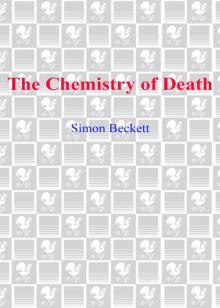 The Chemistry of Death
The Chemistry of Death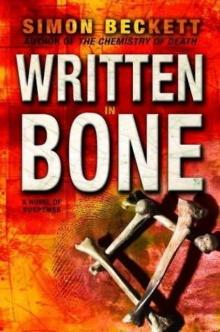 Written in Bone
Written in Bone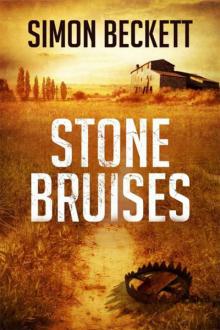 Stone Bruises
Stone Bruises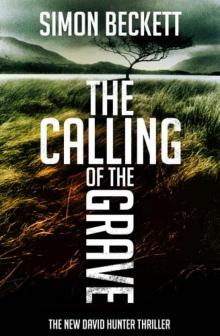 The Calling of the Grave
The Calling of the Grave Whispers of the Dead
Whispers of the Dead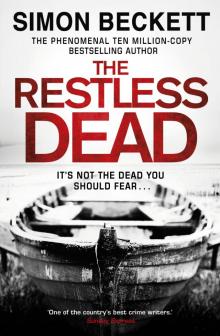 The Restless Dead
The Restless Dead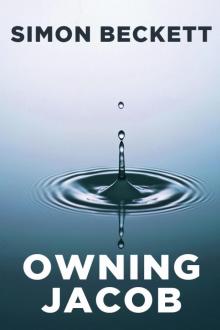 Owning Jacob
Owning Jacob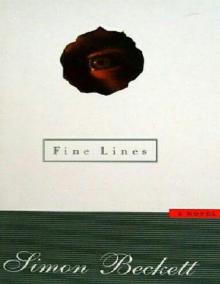 Fine Lines
Fine Lines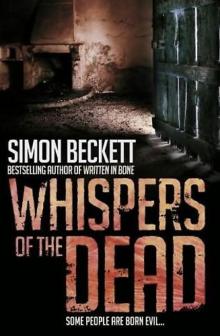 Whispers of the Dead dh-3
Whispers of the Dead dh-3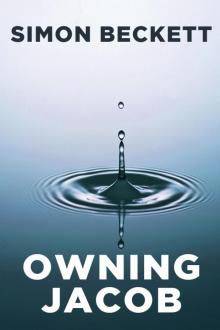 Owning Jacob (1998)
Owning Jacob (1998)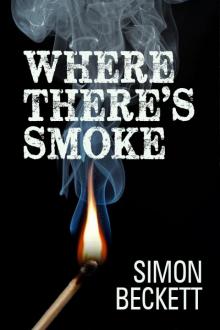 Where There's Smoke (1997)
Where There's Smoke (1997)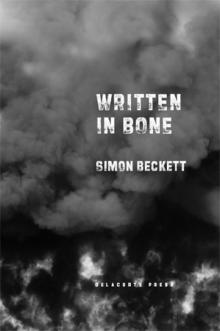 Written in Bone dh-2
Written in Bone dh-2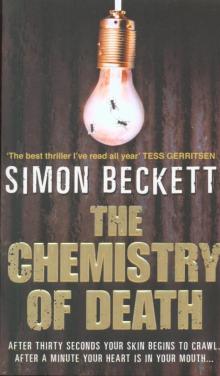 The Chemistry of Death dh-1
The Chemistry of Death dh-1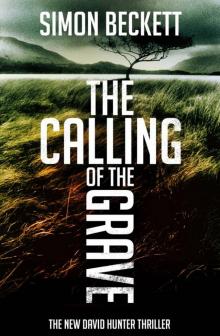 The Calling Of The Grave dh-4
The Calling Of The Grave dh-4